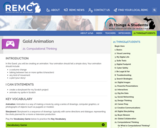
Students learn to create animations using Scratch.
- Subject:
- Education
- Educational Technology
- Material Type:
- Activity/Lab
- Provider:
- REMC Association of Michigan
- Provider Set:
- 21 Things 4 Students
- Date Added:
- 08/03/2021

Students learn to create animations using Scratch.
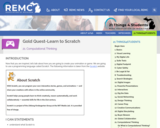
Scratch is a programmable animation program created by M.I.T. for students to use to learn to code, have fun, and create games.
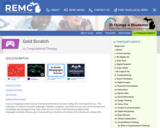
Introduction to a variety of additional coding resources: Scratch, Scratch Animation, Up the Ante, Getting Serious, and Ten resourceds for helping students learn to code and program.
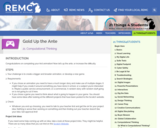
Students use Scratch to create a game.
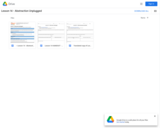
In this lesson, students will be presented with a project that they will decompose with their partners without having access to its code and without access to a computer. Students will work in teams to recreate the project shown in the following lesson.
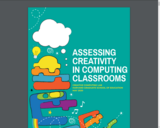
The excitement for the creative power of programming and the questions about how to assess students’ creative work prompted us to undertake this project, which was funded through the generous support of Google’s Computer Science Education Research program. In this project, we were guided by a central question: How do K-12 computing teachers assess creative programming work? Our approach was simple: during the summer of 2019, we talked to 80 K–12 computing teachers across the U.S. about how they supported and assessed creative work in programming activities. In our conversations, typically between two teachers and a member of our team, teachers brought a pair of assessment examples and used those examples as the foundation for a broader discussion about creativity, programming, and assessment.
Through these conversations, as well as an examination of the assessment research literature, we identified key principles that guide the assessment of creative programming activities:
-Foster a classroom culture that values assessment.
-See student process as well as product.
-Understand what is creative for the student.
-Support students by incorporating feedback from multiple perspectives.
-Scaffold opportunities for students to develop judgment of their own work.
Thanks to these incredible teachers who met with us and generously shared their thinking about their practice, we were able to gather more than 300 assessments, ranging from class project rubrics to examples of student project portfolios. In this document, we are sharing our understandings in two ways: (1) a collection of four case studies, and (2) a selection of 50 assessments. The case studies tell the stories of four teachers who are putting the guiding principles of creative assessment into practice in the complex, real-life contexts of their classrooms.
The 50 assessments represent a curated collection of real assessments that teachers are using in their classrooms, accompanied by quotes from teachers about what the assessment of creative work entails.
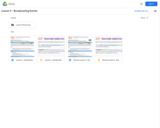
A project using the broadcast blocks in Scratch to create a conversation between 2 characters
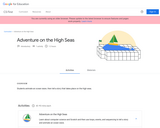
Students animate an ocean wave, then tell a story that takes place on the high seas.
Adventure on the High Seas is a one-hour activity designed to be completed within 45-75 minutes. Students will watch a series of videos and create one coding project with opportunities to personalize their work using “Add-Ons,” which are mini-coding challenges that build on top of the core project.
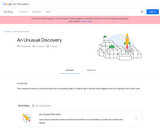
Two characters meet in a world and discover a surprising object. Students get to decide what happens next by creating a story with code.
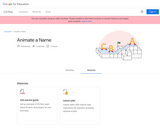
Students pick a name or word and bring the letters to life through animation, sound, and music.
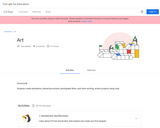
Students create animations, interactive artwork, photograph filters, and other exciting, artistic projects using code.
Art is a complete theme designed to be completed over eight, 45-75 minute sessions. For each activity, students will watch a series of videos and create one coding project with opportunities to personalize their work using “Add-Ons,” which are mini-coding challenges that build on top of the core project.
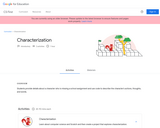
Students provide details about a character who is missing a school assignment and use code to describe the character's actions, thoughts, and words.
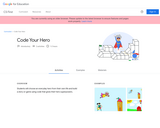
Students will choose an everyday hero from their own life and build a story or game using code that gives their hero superpowers.
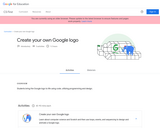
Students bring the Google logo to life using code, utilizing programming and design.
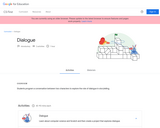
Students program a conversation between two characters to explore the role of dialogue in storytelling.
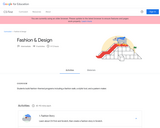
Students build fashion-themed programs including a fashion walk, a stylist tool, and a pattern maker.
Fashion & Design is a complete theme designed to be completed over eight, 45-75 minute sessions. For each Activity, students will watch a series of videos and create one coding project with opportunities to personalize their work using “Add-Ons,” which are mini-coding challenges that build on top of the core project.
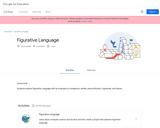
Students explore Figurative Language with an emphasis on metaphors, similes, personification, hyperbole, and idioms.
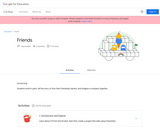
Students work in pairs, tell the story of how their friendship started, and imagine a company together.
Friends is a complete theme designed to be completed over eight, 45-75 minute sessions. For each Activity, students will watch a series of videos and create one coding project with opportunities to personalize their work using “Add-Ons,” which are mini-coding challenges that build on top of the core project.
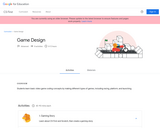
Students learn basic video game coding concepts by making different types of games, including racing, platform, and launching.
Game Design is a complete theme designed to be completed over eight, 45-75 minute sessions. For each activity, students will watch a series of videos and create one coding project with opportunities to personalize their work using “Add-Ons,” which are mini-coding challenges that build on top of the core project.
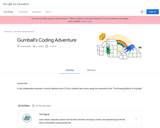
In this collaboration between Cartoon Network and CS First, students tell a story using the characters from “The Amazing World of Gumball.”
Gumball’s Coding Adventure is a one-hour activity designed to be completed within 45-75 minutes. Students will watch a series of videos and create one coding project with opportunities to personalize their work using “Add-Ons,” which are mini-coding challenges that build on top of the core project.